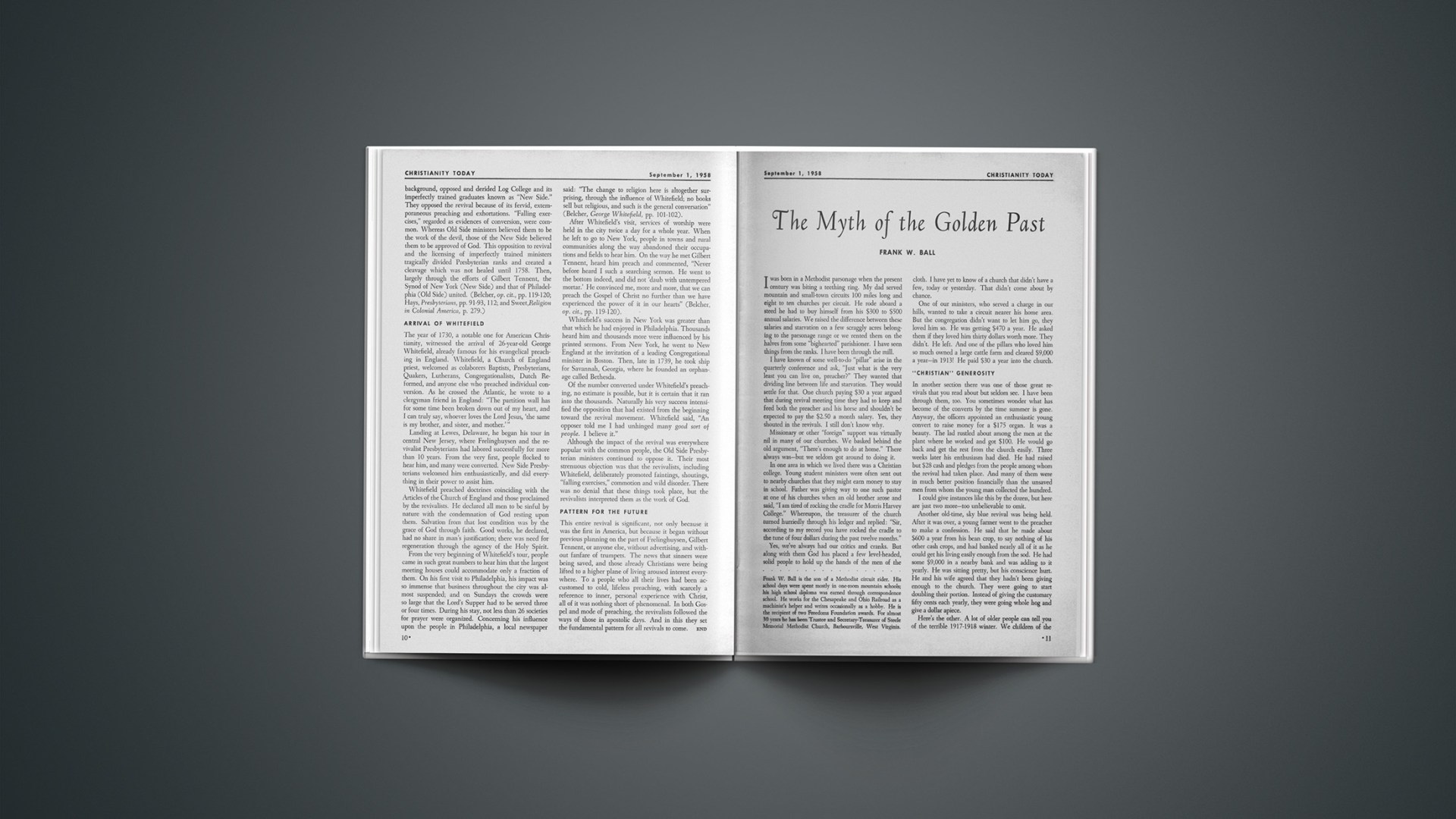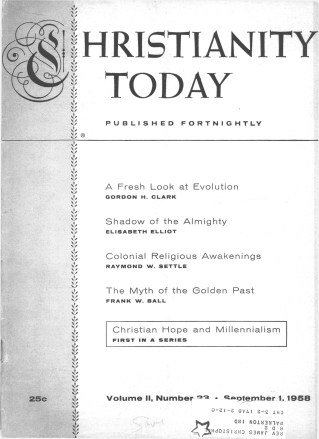I was born in a Methodist parsonage when the present century was biting a teething ring. My dad served mountain and small-town circuits 100 miles long and eight to ten churches per circuit. He rode aboard a steed he had to buy himself from his $300 to $500 annual salaries. We raised the difference between these salaries and starvation on a few scraggly acres belonging to the parsonage range or we rented them on the halves from some “bighearted” parishioner. I have seen things from the ranks. I have been through the mill.
I have known of some well-to-do “pillar” arise in the quarterly conference and ask, “Just what is the very least you can live on, preacher?” They wanted that dividing line between life and starvation. They would settle for that. One church paying $30 a year argued that during revival meeting time they had to keep and feed both the preacher and his horse and shouldn’t be expected to pay the $2.50 a month salary. Yes, they shouted in the revivals. I still don’t know why.
Missionary or other “foreign” support was virtually nil in many of our churches. We basked behind the old argument, “There’s enough to do at home.” There always was—but we seldom got around to doing it.
In one area in which we lived there was a Christian college. Young student ministers were often sent out to nearby churches that they might earn money to stay in school. Father was giving way to one such pastor at one of his churches when an old brother arose and said, “I am tired of rocking the cradle for Morris Harvey College.” Whereupon, the treasurer of the church turned hurriedly through his ledger and replied: “Sir, according to my record you have rocked the cradle to the tune of four dollars during the past twelve months.”
Yes, we’ve always had our critics and cranks. But along with them God has placed a few level-headed, solid people to hold up the hands of the men of the cloth. I have yet to know of a church that didn’t have a few, today or yesterday. That didn’t come about by chance.
One of our ministers, who served a charge in our hills, wanted to take a circuit nearer his home area. But the congregation didn’t want to let him go, they loved him so. He was getting $470 a year. He asked them if they loved him thirty dollars worth more. They didn’t. He left. And one of the pillars who loved him so much owned a large cattle farm and cleared $9,000 a year—in 1913! He paid $30 a year into the church.
“Christian” Generosity
In another section there was one of those great revivals that you read about but seldom see. I have been through them, too. You sometimes wonder what has become of the converts by the time summer is gone. Anyway, the officers appointed an enthusiastic young convert to raise money for a $175 organ. It was a beauty. The lad rustled about among the men at the plant where he worked and got $100. He would go back and get the rest from the church easily. Three weeks later his enthusiasm had died. He had raised but $28 cash and pledges from the people among whom the revival had taken place. And many of them were in much better position financially than the unsaved men from whom the young man collected the hundred.
I could give instances like this by the dozen, but here are just two more—too unbelievable to omit.
Another old-time, sky blue revival was being held. After it was over, a young farmer went to the preacher to make a confession. He said that he made about $600 a year from his bean crop, to say nothing of his other cash crops, and had banked nearly all of it as he could get his living easily enough from the sod. He had some $9,000 in a nearby bank and was adding to it yearly. He was sitting pretty, but his conscience hurt. He and his wife agreed that they hadn’t been giving enough to the church. They were going to start doubling their portion. Instead of giving the customary fifty cents each yearly, they were going whole hog and give a dollar apiece.
Here’s the other. A lot of older people can tell you of the terrible 1917–1918 winter. We children of the parsonage would run from home to school, the store, or the church, and back again, to keep from freezing en route. The coldest day of this century was the Sunday before Christmas, 1917.
My mother and a few other women of the church had braved the elements to gather in a few dollars to add to their own for a Christmas treat for the children. Several had refused to give, including the town’s lone merchant, from whom they had to buy the candy at full price. He needed that profit to add to the $100,000 estate that was already his. Neither he nor his wife ever darkened a church door. His children went occasionally—with a penny each.
But the Sunday the treat was to be given out, the wife and three of her four children braved the 20-below zero cold to an unheated church to garner four sacks of that precious candy the head of the house had sold the good ladies of the church the day before.
Did you ever drive through the country, especially the hill country, and wonder why various church buildings were located so inconveniently? I’ll tell you. Every-time members decided to build a church, there was always some old codger who couldn’t give any money but would gladly donate the land. The rest of them took his scraggly mountainside site to save money or to keep from inheriting his wrath and his family’s for the next 40 years for turning it down. And there was always that clause in the deed: should the land ever be used for anything other than a church building, it was to revert to the heirs of the donor—for a pasture for goats.
Considering these facts, one does oftentimes wonder how there could be any revivals in those days.
I knew an old German farmer who loaded up his jolt wagon every Sunday morning and took a dozen or more of his neighbors to church. He gathered his family around him three times daily for family prayer. And he let ministers have a choice piece of bottom land free.
I knew a faithful spinster who worked untiringly with the youth, directing them in whatever affairs of religion they would take part. I knew a lady pianist who had sat on the same stool for 40 years hardly missing a Sunday. I’ve known business men and professional men of the old era plunk down many a dollar on the barrelhead that they might have spent well on their families. I knew one lady who drove seven miles round trip to and from church in an open buggy every Sunday morning, hauling her three younger children with her and letting the two older walk behind. She attended every service of a three-week revival meeting in weather that hovered around zero.
I knew an aged mother who fasted and prayed in our mountains telling God she wouldn’t eat any more until people were saved in a revival going on that had come to a stalemate in the community. The miracle happened. God didn’t let her down.
I knew a school teacher and a doctor who just about financed the parsonage at one point releasing dad from his regular duties in order that he might travel through our valley praying with the parents whose sons were leaving for army camps during World War I, and the hundreds who lay sick and dying during the influenza epidemic that followed.
Yes, there have been pillars of the church down through the ages. But the sanctity of the church of your grandfather’s day, as a whole, was no greater than that of the church today. In most instances, admittedly, they worshiped with a lot more zeal and boisterousness; but there was often no missionary spirit, no movement reaching beyond the horizon. There was little, if any, youth organization. There was only skeletal church organization in any except the urban sections as compared with our great church mechanism of the present. The machinery that keeps the church movement orderly today wouldn’t have operated 50 years ago. There was not the necessary motivation.
We didn’t have stately brick churches prominently situated. We had little frame buildings on hillsides or side streets. Go out into the rural sections of our country and you’ll see the evidence.
The Great Drama
Young man, young woman, you are living in the greatest age of church history. You have a part, a very vital part, to play in this great religious drama. Yours is one of inspiration to the older members. Yours is one of accomplishment, of opportunity, of achievement. Your voice is heard in our conferences, a thing virtually unheard of when your grandpa was young.
Collections toward the great undertakings of the church were unknown and undreamed of, even in proportion to the times, when I was in knee pants. The funds for the building of $100,000 churches, pensions for aged ministers, insurance policies for them in case they die in harness, and various other funds of the church were nonexistent or had little force if they did exist. You have had a part in building this great organization we call the church. Don’t let anybody kid you.
The children of the parsonage were not always respected as they are today. Let the old timers say what they will. The minister’s kids wore cast-off clothing and ate what wouldn’t sell in the market place. I bought the first overshoes and overcoat I ever owned with money I made by working in the coal mines. I thought those things were luxuries for the rich people, people like those who sold mother the Christmas candy, then came next day with hands outstretched wanting part of it back.
Son or daughter of the parsonage or manse, rejoice and be exceedingly glad. You are living in one of the best days in church history.
Frank W. Ball is the son of a Methodist circuit rider. His school days were spent mostly in one-room mountain schools; his high school diploma was earned through correspondence school. He works for the Chesapeake and Ohio Railroad as a machinist’s helper and writes occasionally as a hobby. He is the recipient of two Freedoms Foundation awards. For almost 30 years he has been Trustee and Secretary-Treasurer of Steele Memorial Methodist Church, Barboursville, West Virginia.










